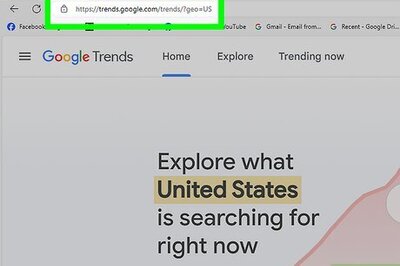
views
To understand what this is all about, a quick refresher course in the history of the company is required. Once it comprehensively won the Big Browser Battle I sometime in early 2002, by bashing Netscape to a pulp with its Internet Explorer browser, Microsoft took its eyes off the ball and allowed the horse, the barn and the entire farm to bolt by leaving its most potent weapon, its browser, to languish in doing oddball jobs like taking out the trash, while it could have comfortably taken over the world. Yes, it did dominate the world in terms of presence, but in terms of innovation and usefulness, Internet Explorer had frozen in time sometime in 2002.
We will come back to the Internet Explorer goof up in a bit, because the current furor is not about that mistake, but about the enigma called Vista. Vista was spoken about first in 2001 as the revolutionary new operating system from the Microsoft stable. Through its various delays the product has gone through multiple changes in features (with more being dropped and less being added). The latest delay, because of which the product is to miss its lucrative 2006 year-end date for the retail channel release, has led to a gaggle of write-ups on how it will bring forth the downfall of Microsoft.
Even if it were to bring out the best operating system the world has seen in Vista, Microsoft still won't be in the clear by any means. If anything, it is neither Vista, nor XP, or even .Net that has been the company's downfall. What will bring down the company is that it did absolutely nothing with its most potent weapon, its browser which was installed on 99% of Windows PCs till 2004-2005.
In tying up all of its products, and its fortunes, on its core operating system, the company has created a situation from which it cannot effectively leverage the benefits that are offered by the internet platform, even if it wants to because that would go against its core agenda. To keep the demand rising for its new products, Microsoft keeps raising the bar for using the new products. A lot of new features pushed out by Microsoft by the time Vista is released would not work on other browsers (at least not out of the box, and when they do work, it will be with a decreased feature set) and same would probably be the case with even Internet Explorer versions lower than 5.5.
Thus, effectively, the new Microsoft platform will work, as advertised, only for consumers who can afford to shell out that kind of money. Even though the upcoming release of Internet Explorer 7, according to the company, will install on platforms going back to Windows 95, running it on a Windows XP laptop with 256 MB of RAM has been a pain itself. So, ideally, even the Live product line will work best on a Vista-capable PC, beefed up by the latest version of the company's browser. The trouble is that, unlike 2002, there are other options in two products -- Mozilla Firefox and the Google line up -- that is giving Microsoft sleepless nights.
Google and Firefox together represent a deadly mix for Microsoft. Both represent product lines and ideas that Microsoft cannot fight, at least in its present shape. Firefox, the browser, is developed mostly by a bunch of volunteers, compared to the dedicated team of employees who develop Microsoft's browser. Internet Explorer still commands a huge lead, in excess of 85%, of the browser users, but the 12% that Firefox users represent is not there because of OEM tie ups or other bundling deals that Microsoft is famous for. In Google, the company has a rival whose product line it can't compete with. Search, for Microsoft has improved vastly, but it has very little market share. The company has a huge number of captive users in Hotmail, but Gmail is winning over more users and is hitting Microsoft precisely where it hurts -- the average Doe market -- by making it easier to use the information, using only a browser and an internet connection.
In embedding the browser deep into the operating system Microsoft has already lost half the war by raising the entry barrier so high that it would be difficult for everyone to jump in. Compared to this, Google's entry barrier is a system that will run a recent version of Firefox, a browser that is already supported across many platforms, and an internet connection. Microsoft can build all the cool features it wants to, but an Internet Explorer fused with the Windows OS is going nowhere. Ideally, they should have put the operating system in the browser, at least a virtualisation of it, but they have not. And as long as Internet Explorer does not become a platform on which anyone and everyone can develop things and run on any platform, Microsoft will always be on the defensive and also potentially lose the Browser Wars II at a later stage.
So irrespective of the Terabytes that Scoble might want Gates to throw at the user, it just won't do the magic for Microsoft because its core strategy works against that kind of adventure. Moreover, Google is already way ahead in terms of that, even if you were to ignore the problems with perception that Microsoft has. A huge pluggable computing infrastructure is not a new idea. Sun has been beating that drum for ages now and Google is doing it already, allowing it to scale up and add new applications with no great additional cost. For Microsoft to do the same and get ahead in that game, it will have to do the unthinkable and give away Vista for free, get people to pay for support and ensure that Internet Explorer becomes the web platform of choice that works well than remain the buggy, insecure, control freak that it is right now.
Only problem is that none of these are likely to happen and slowly but surely users will, like me, move away to an environment where the browser alone does all my text editing, Email, FTP, Chat and other things in its latest versions without any upgrades of the computing infrastructure. Even in its horrible 1.5.0.2 release, Firefox does all of this for me using only 82 megabytes of memory, than require a brand new computer to do all that. If Internet Explorer was good and if it had gotten enough attention from the company to egg it on to make it the firm's number one product none of this would have happened. In short, terabytes or not, the moonshot will do nothing for Microsoft. first published:April 24, 2006, 19:30 ISTlast updated:April 24, 2006, 19:30 IST
window._taboola = window._taboola || [];_taboola.push({mode: 'thumbnails-mid-article',container: 'taboola-mid-article-thumbnails',placement: 'Mid Article Thumbnails',target_type: 'mix'});
let eventFire = false;
window.addEventListener('scroll', () => {
if (window.taboolaInt && !eventFire) {
setTimeout(() => {
ga('send', 'event', 'Mid Article Thumbnails', 'PV');
ga('set', 'dimension22', "Taboola Yes");
}, 4000);
eventFire = true;
}
});
window._taboola = window._taboola || [];_taboola.push({mode: 'thumbnails-a', container: 'taboola-below-article-thumbnails', placement: 'Below Article Thumbnails', target_type: 'mix' });Latest News
Well, the title is not quite accurate, but the easier and cheaper way to go about what Microsoft Corp's most audible voice on the internet, Robert Scoble, said is for the company to buy Google and save quite a few bucks and a whole lot of sweat in the process. Robert, in a recent blog post, says that the company requires a moonshot, one that would give "A guaranteed Terabyte of Internet-based storage space for EVERYTHING and for EVERYONE running Windows in the world".
To understand what this is all about, a quick refresher course in the history of the company is required. Once it comprehensively won the Big Browser Battle I sometime in early 2002, by bashing Netscape to a pulp with its Internet Explorer browser, Microsoft took its eyes off the ball and allowed the horse, the barn and the entire farm to bolt by leaving its most potent weapon, its browser, to languish in doing oddball jobs like taking out the trash, while it could have comfortably taken over the world. Yes, it did dominate the world in terms of presence, but in terms of innovation and usefulness, Internet Explorer had frozen in time sometime in 2002.
We will come back to the Internet Explorer goof up in a bit, because the current furor is not about that mistake, but about the enigma called Vista. Vista was spoken about first in 2001 as the revolutionary new operating system from the Microsoft stable. Through its various delays the product has gone through multiple changes in features (with more being dropped and less being added). The latest delay, because of which the product is to miss its lucrative 2006 year-end date for the retail channel release, has led to a gaggle of write-ups on how it will bring forth the downfall of Microsoft.
Even if it were to bring out the best operating system the world has seen in Vista, Microsoft still won't be in the clear by any means. If anything, it is neither Vista, nor XP, or even .Net that has been the company's downfall. What will bring down the company is that it did absolutely nothing with its most potent weapon, its browser which was installed on 99% of Windows PCs till 2004-2005.
In tying up all of its products, and its fortunes, on its core operating system, the company has created a situation from which it cannot effectively leverage the benefits that are offered by the internet platform, even if it wants to because that would go against its core agenda. To keep the demand rising for its new products, Microsoft keeps raising the bar for using the new products. A lot of new features pushed out by Microsoft by the time Vista is released would not work on other browsers (at least not out of the box, and when they do work, it will be with a decreased feature set) and same would probably be the case with even Internet Explorer versions lower than 5.5.
Thus, effectively, the new Microsoft platform will work, as advertised, only for consumers who can afford to shell out that kind of money. Even though the upcoming release of Internet Explorer 7, according to the company, will install on platforms going back to Windows 95, running it on a Windows XP laptop with 256 MB of RAM has been a pain itself. So, ideally, even the Live product line will work best on a Vista-capable PC, beefed up by the latest version of the company's browser. The trouble is that, unlike 2002, there are other options in two products -- Mozilla Firefox and the Google line up -- that is giving Microsoft sleepless nights.
Google and Firefox together represent a deadly mix for Microsoft. Both represent product lines and ideas that Microsoft cannot fight, at least in its present shape. Firefox, the browser, is developed mostly by a bunch of volunteers, compared to the dedicated team of employees who develop Microsoft's browser. Internet Explorer still commands a huge lead, in excess of 85%, of the browser users, but the 12% that Firefox users represent is not there because of OEM tie ups or other bundling deals that Microsoft is famous for. In Google, the company has a rival whose product line it can't compete with. Search, for Microsoft has improved vastly, but it has very little market share. The company has a huge number of captive users in Hotmail, but Gmail is winning over more users and is hitting Microsoft precisely where it hurts -- the average Doe market -- by making it easier to use the information, using only a browser and an internet connection.
In embedding the browser deep into the operating system Microsoft has already lost half the war by raising the entry barrier so high that it would be difficult for everyone to jump in. Compared to this, Google's entry barrier is a system that will run a recent version of Firefox, a browser that is already supported across many platforms, and an internet connection. Microsoft can build all the cool features it wants to, but an Internet Explorer fused with the Windows OS is going nowhere. Ideally, they should have put the operating system in the browser, at least a virtualisation of it, but they have not. And as long as Internet Explorer does not become a platform on which anyone and everyone can develop things and run on any platform, Microsoft will always be on the defensive and also potentially lose the Browser Wars II at a later stage.
So irrespective of the Terabytes that Scoble might want Gates to throw at the user, it just won't do the magic for Microsoft because its core strategy works against that kind of adventure. Moreover, Google is already way ahead in terms of that, even if you were to ignore the problems with perception that Microsoft has. A huge pluggable computing infrastructure is not a new idea. Sun has been beating that drum for ages now and Google is doing it already, allowing it to scale up and add new applications with no great additional cost. For Microsoft to do the same and get ahead in that game, it will have to do the unthinkable and give away Vista for free, get people to pay for support and ensure that Internet Explorer becomes the web platform of choice that works well than remain the buggy, insecure, control freak that it is right now.
Only problem is that none of these are likely to happen and slowly but surely users will, like me, move away to an environment where the browser alone does all my text editing, Email, FTP, Chat and other things in its latest versions without any upgrades of the computing infrastructure. Even in its horrible 1.5.0.2 release, Firefox does all of this for me using only 82 megabytes of memory, than require a brand new computer to do all that. If Internet Explorer was good and if it had gotten enough attention from the company to egg it on to make it the firm's number one product none of this would have happened. In short, terabytes or not, the moonshot will do nothing for Microsoft.

















Comments
0 comment